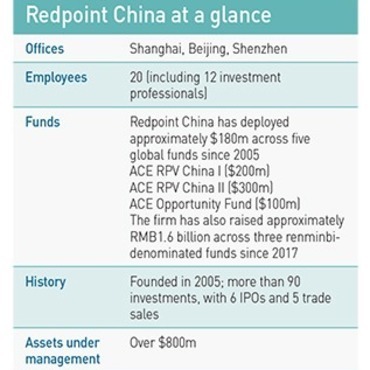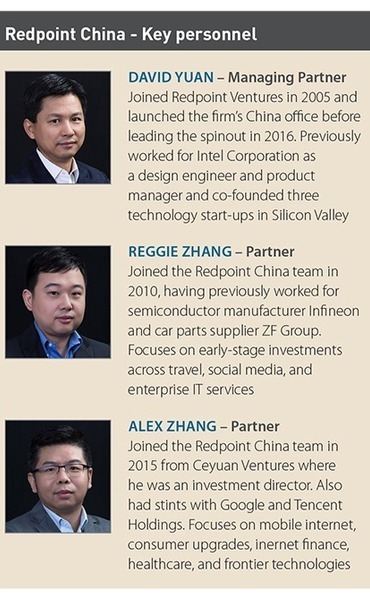
GP profile: Redpoint China Ventures

Redpoint China Ventures spun out from its US parent in 2016, but the knowledge it retained – and the communication that remains – has been key to moving early on enterprise technology
When Snowflake, a US cloud data warehousing start-up listed in NASDAQ earlier this month, having raised $3.4 billion in the largest-ever software IPO, several early-stage investors registered massive paper gains. Redpoint Ventures was among them.
The venture capital firm led Snowflake's Series B round in early 2014 at a valuation of about $60 million. Now, with the newly listed company enjoying a market capitalization of more than $60 billion, Redpoint is sitting on a 1,000x return, as yet unrealized.
The Series B valuation was large enough to scare off many other investors. Another concern was competition from divisions of the established internet giants, including Amazon's AWS, Microsoft's Azure and Google Cloud. But Redpoint understood the value of Snowflake's revolutionary architecture that separates computing and storage to enable seamless scaling.
Redpoint China Ventures, an independent China business that was incubated in-house, is looking to replicate its parent's success. There is plenty of white space. "China is basically 10 years behind the US in the field of enterprise software and enterprise IT services. From revenue to the total market value of listed companies, China accounts for 1% of its equivalents in the US," says David Yuan, founding and managing partner at Redpoint China.
Even though the enterprise services industry is now widely recognized as the golden child of Chinese venture capital, with firms devoting ever more resources to deal-sourcing in this area, it is a relatively new phenomenon. China technology investment, unlike the US, has strong consumer-facing origins. Five years ago, enterprise services was not a priority.
Luke Han knows this firsthand. In 2015, he founded data analytics business Kyligence and struggled to get traction with any VCs. "I met with many investors and Redpoint was the only one that supported us. At that time, very few investors understood the value and the business model of enterprise software," Han tells AVCJ.
Redpoint invested several million dollars in 2016 and re-upped in all the subsequent rounds as the likes of Shunwei Capital, CBC Capital, and Eight Roads joined the cap table. The most recent round was a $25 million Series C last year led by Coatue Management. Meanwhile, Redpoint helped Kyligence enter the US market, which represents about 40% of sales.
"None of our founding team had an overseas background. Kyle Liu [a principle at Redpoint China] connected us with local recruitment firms, investors, and other useful resources. Every time I go to the US, I catch up with Tomasz Tunguz [a partner at Redpoint Ventures who was involved in the Snowflake investment from the beginning] and other partners of Redpoint Ventures. They have made multiple helpful suggestions on our business model and how to operate in the US," says Han.
A fundamental shift
Although China is playing catchup in enterprise software, Han believes the country has two key advantages that make it competitive with the US. First, China has the world's largest base of engineering graduates – supposedly twice as many as the US – who can deliver with speed and accuracy. Second, the scale of China's data and the complexity of its usage scenarios are unique, driven by advanced consumer-end applications.
"Our products have overcome some extreme challenges, overseas customers had never witnessed such complex processing," he adds.

"The Chinese market has undergone substantial reform. More innovation is originating from China, and some of it is even being copied in the US. Many of the functional designs developed by TikTok have been followed by Facebook; Uber Eats borrowed Meituan-Dianping's O2O [online-to-offline] model. O2O may have started in the US, but its landing and breakthrough as a sustainable business happened in China," says Redpoint China's Yuan.
Founded in 1999, Redpoint Ventures has $5.7 billion in assets and has backed 518 companies, accumulating 157 IPO and M&A exits. In 2000, it was one of the first Silicon Valley venture capital firms to invest in China. The debut deal involved China eNet, an internet portal operator. Another early investee, semiconductor fabrication equipment manufacturer AMEC, was among the first companies to list on Shanghai's Star Market last year.
Without a local presence, Redpoint Ventures invested on a fly-in-fly-out basis. But the emergence of a new wave of Chinese internet companies, including search platform Baidu and online travel services specialist Ctrip, compelled it to take the country more seriously. A China office opened in 2005 led by Yuan, an Intel Corporation alumnus and serial entrepreneur who had co-founded three US start-ups in IT and telecommunications.
Operating as a one-man army, Yuan's initial deals included Xicheng Media, which was soon acquired by Focus Media. In the summer of 2006, he met Hongyi Zhou, founder of internet security software player Qihoo 360 and took part in the company's Series B. Qihoo listed in the US in 2011 and Redpoint Ventures exited a year later with a sizeable return.
The firm raised five global funds between 2005 and 2015, with China accounting for 10-20% of each one. The local team would handle deal-sourcing and portfolio management, with a 10-strong, US-centric global investment committee signing off on all deals. "Each member needed to understand projects in detail. The communication and education costs were very high, and we were not able to respond quickly to local opportunities," says Yuan.
Moreover, the decision-making structure was US-centric because China strategies involved delivering local landings of mature innovations developed in the US. It was hard to get approval for a China project without a Silicon Valley reference point.
In 2010, when Redpoint Ventures launched Fund V, there was a recognition that the firm must move faster to secure deals in the face of intensifying competition. Several sub-committees were established internally to make decisions in different sectors. A dedicated China committee was also formed.
The streamlined approach paid off. Between 2010 and 2015, the China team made astute early bets in each mobile internet sub-segment. It backed local leaders such as Domob in advertising, iDreamSky in gaming, Bangcle in security, Apus in overseas apps, and Yixia in video sharing.
Going solo
On achieving independence, the team quickly closed its debut China fund with $180 million in commitments. A renminbi-denominated vehicle of RMB700 million ($110 million) was raised two years later. In 2019, Redpoint China tapped US dollar investors for even more money. Fund II closed at $400 million, comprising a core vehicle of $300 million for early-stage investments and a $100 million opportunity fund for growth-stage deals.

Redpoint China's headcount has grown to 20, including 12 investment professionals, based in Shanghai, Beijing and Shenzhen. "We will expand our team this year. If you break it down by sector, about two-thirds of our investors focus on enterprise software and technology and one-third concentrates on consumer-related start-ups," says Yuan.
Despite striking out on its own, the China entity retains ties to the global business. They share a back-end IT platform and regularly exchange ideas on deal-sourcing and decision-making. Senior members of the US team are investors in the China fund and vice versa. There is also, unsurprisingly, a lot of overlap in terms of LPs. Two-thirds of the overall investor base has exposure to both teams.
When Reggie Zhang joined Redpoint China in 2010, he found himself surrounded by likeminded individuals. A Tsinghua University graduate, Zhang worked for two German companies, car parts supplier ZF Group and semiconductor manufacturer Infineon Technologies, for several years.
A strong grounding in science and engineering coupled with industry experience means the firm's investment professionals can establish credibility with start-up founders and speak their language, according to Zhang. "The basic point of judgment for any project is that we want to see the technological empowerment, whether it is consumer sector, or cutting-edge technology or corporate services," he adds.
Another distinctive feature of the firm is efficiency, perhaps with the earlier unwieldy structure living long in the team's memory. Online education start-up Jojo Reading Academy is offered as a case in point. Redpoint China offered a term sheet immediately after the initial meeting with Wei Wei, the company's founder. The company has since closed five more funding rounds.
"Our gross merchandise volume has increased 30-fold in the past year and our valuation has grown 12-fold since Redpoint China's first investment," Wei tells AVCJ, adding that Sinovation Ventures came in a week later at a higher valuation. "We operate in a fiercely competitive environment, so we have to move quickly. I ask investors to deliver the capital within 20-30 days. If they can't make it, they can join the next round."
This ability to move quickly is underpinned by a detailed understanding of industries and deep engagement with companies. Kyligence, for example, invites Redpoint China to sit on interviews with potential senior hires because its input is valued. "We try to be the investor with the most interaction and the closest relationship with our companies, so we can make suggestions easily," says Zhang.
Effective two-way dialogue can save everyone a lot of time and money. One of the classic start-up failings is the repeat pivot as companies without clear technology landing strategies change direction again and again in search of a breakthrough. Zhang observes that Redpoint China can stop these missteps from happening by ensuring companies think clearly about the customer pain points they are supposed to be addressing.
A bridge broken
The firm believes it is well-positioned – in terms of local bandwidth, skills and experience – to help develop the next generation of Chinese enterprise services businesses. However, the broader venture capital industry is at a turning point. Redpoint Ventures' China entry was predicated on an interaction between East and West, with the ideas initially going in one direction but latterly moving backwards and forwards. Now that relationship is fracturing.
Tensions between China and the US have escalated from trade into technology and into financial services. This has serious implications for start-ups in China. First, US listings are likely to become less commonplace as domestic IPOs come to the fore, aided by recent initiatives intended to speed up the process and make it more accessible for technology companies. Second, new growth opportunities will emerge as China seeks local replacements for its foreign suppliers, across all facets of software and hardware.
"I think the US-China decoupling is inevitable in the short term," says Yuan. "In the next few years, we will see two independent ecological environments for everything from underlying infrastructure to operating systems to applications."
Latest News
Asian GPs slow implementation of ESG policies - survey
Asia-based private equity firms are assigning more dedicated resources to environment, social, and governance (ESG) programmes, but policy changes have slowed in the past 12 months, in part due to concerns raised internally and by LPs, according to a...
Singapore fintech start-up LXA gets $10m seed round
New Enterprise Associates (NEA) has led a USD 10m seed round for Singapore’s LXA, a financial technology start-up launched by a former Asia senior executive at The Blackstone Group.
India's InCred announces $60m round, claims unicorn status
Indian non-bank lender InCred Financial Services said it has received INR 5bn (USD 60m) at a valuation of at least USD 1bn from unnamed investors including “a global private equity fund.”
Insight leads $50m round for Australia's Roller
Insight Partners has led a USD 50m round for Australia’s Roller, a venue management software provider specializing in family fun parks.








